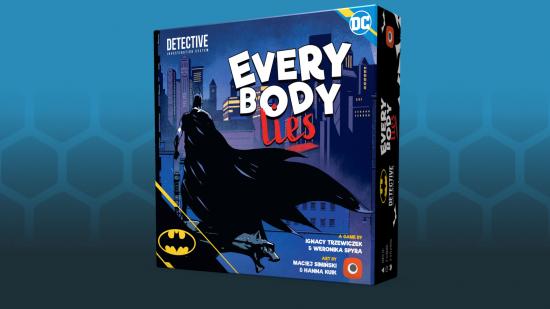Our Verdict
You'll have a good time with Batman: Everybody Lies, and it's very pretty, but if you're not in love with the Batman theme, other crime-solving capers do more with less.
An important thing to know about Batman: Everybody Lies right off the… jump, is that no one’s playing as Batman. Also, while there’s faint nods in that direction (which we’ll get to later) you probably won’t be doing much lying. That’s because Batman: Everybody Lies is not a social deduction board game, as the name might suggest, but a cowled crusader-themed spin-off entry in Portal Games’ crime-solving Detective series.
In Batman: Everybody Lies, you and up to three other players are tasked with completing three cases (and one, shorter prologue mission) in DC’s most crime-riddled city. You do this by following story cards in a sort of ‘choose your own adventure’ gamebook style. These describe your characters visiting different locations, interviewing folk, reading files (accessed through a handy companion website) and generally splitting up to search for clues. If you’ve played another Detective title, you’ll be familiar with the premise, but it’s not a far cry from similar mystery board games like Sherlock Holmes: Consulting Detective.
While I enjoyed gallivanting around the streets of Gotham, interviewing strangely gossipy gang members, and ghosting the Joker, there are quite a few chinks in this detective board game’s black, kevlar armour that are worthy of closer inspection.

Gotham City Living
Rather than a billionaire with limitless gadgets and resources, in Batman: Everybody Lies you play a motley crew working for Jim Gordon. There’s at least one famous face – Catwoman – but the other characters, journalists Vicki Vale and Warren Spacey, and detective Harvey Bullock, are probably less recognizable to the casual Batfan.
This may seem like a strange choice, and some may find it disappointing not to be donning cowl and cape. Personally, I think it’s quite effective. It means you’re interacting with Gotham from the perspective of, more-or-less, the Average Joe. There’s plenty of comic book silliness to be found (strange chemicals and bat attacks abound) but the game as a whole has a more grounded feel than you might predict at the outset.
Don’t get me wrong, there’s no shortage of larger than life Batman villains in the game, and it’s pretty neat when you stumble upon a baddy in plain clothes or find a villain’s lair, and recognition slowly dawns, but these appearances usually feel like cameos. The meat of your investigation is more pedestrian: speaking to real estate agents, visiting orphanages, and trying to get the jist of tangled gang allegiances. As I say, I preferred this, but it may not be what you’re expecting from a Batman game.

Form and function
One thing that will certainly go down nicely with Batman fans, though, is the look of Batman: Everybody Lies. The components impress right from the outset, with the striking box. Its lovely comic book style continues within, featured in everything from the game’s miniature board with its eight location tiles, to the fold-out Gotham City map that lets you get a lay of the land.
Thinking fun: The best strategy board games
Sporadically, you’ll be invited to check out scene cards that serve as miniature comic strips, depicting the events of the story card you’re reading. You’ll also access articles through an online database, which come complete with illustrations. There’s plenty to pour over, and deductions made from studying scene cards and map locations sort of pay dividends here and there. Even if they’re mostly just for show, it all helps to immerse you in the game’s world.

However, while this game is certainly nice to look at, some of its ‘gamier’ elements don’t play so well…
In Batman: Everybody Lies, as you progress, you’ll gradually accumulate evidence tokens, and these have a number of uses. Each player character has a unique ability to convert them to different kinds of access token, which you’ll need to use to visit half the locations on the board.
However, these abilities are all very samey, and don’t do anything to make the characters that have them stand out. If you’re playing with fewer than max players, the unused characters become ‘informants’, which means you still have access to their ability. This makes it feels more like the group is working with a ‘pool’ of powers, rather than everyone having a cool, unique thing they can do.
A more fundamental problem is that you get evidence tokens pretty much no matter where you go, and you can visit any lead at any time. That means there’s no real resource management to puzzle over. If you’re running low on evidence tokens, you just go somewhere else and come back later. Time is off the essence, kinda, but my groups never felt at all limited by the tokens. We were soon tempted to do away with them and just focus on the story.

No lies here!
One thing that does a decent job of helping you get to grips with your character is the inclusion of personal goals. These are side missions, which the game suggests you might want to keep secret from the rest of your team, or even lie about. However, if this is where the ‘Everybody Lies’ subtitle comes from, it’s a bit of a misnomer, because in practice nobody lied.
Not because we’re all such upstanding citizens, but simply because almost all the personal goals were entirely innocuous, and they were often something the group actively wanted to investigate anyhow. In the end this meant everyone played with all cards on the table. Not doing so would have looked deeply dodgy, and as I say, the truth was far less fishy than what our suspicious imaginations would’ve conjured.
More fibbing: The best social deduction games
These are some of the main ways Batman: Everybody Lies attempts to differentiate itself from similar mystery titles, but unfortunately the tokens feel like fiddly distractions, and the personal goals are not quite fully realised.
One mechanical element that does seem more worthwhile is a progress tracker, which encourages you to stop investigating early to get a better score. This adds a nice sense of urgency to events.

On the Case
The somewhat unnecessary mechanics could be forgiven completely, at least by me, if the story and mysteries in Batman: Everybody Lies truly sparkled. But unfortunately, they never quite manage to.
Detective is a series well known for involving a lot of reading, and to solve its cases, Batman: Everybody Lies requires you to pick out the key details from dense descriptions, often processing a lot of mundane information.
In the end, even sharing the load between several players, reading long-winded descriptions aloud (and listening to them) for such lengthy periods (Portal Games suggests each case will take 2-3 hours, but to me this seems like an underestimate) becomes tiring. It seems like the game would work best solo, or in a pair, where you could read in your head, and skim over the unimportant stuff.
The writing is mostly functional, but never outstanding. And there are low points. There’s a fair bit of heavy-handed exposition, and while some characters you encounter are written well, others are unconvincing. Examples include a gang member complaining about someone being “treated like they’re made of porcelain” and a small child saying “they eavesdropped” a conversation. There are constant little things like this which eventually start to stand out.

The mystery-solving itself is mostly enjoyable – obviously a good thing, in a mystery game. The first half-a-dozen cards, which seem to be where you’ll make most of your headway, are particularly satisfying. The cases are easy to get into, and you’ll soon all be jotting down notes, drawing connections, and coming up with elaborate, hairbrained theories. It’s also a clever touch that the cases can be played standalone but also link together and form one, overarching story.
However, because leads are never shut off to you, and the game has more story cards than you could possibly read given the time limit, the conclusion of a case in Batman: Everybody Lies is often the least satisfying part.
As you start to close in on a solution, progress becomes more incremental. Until finally, urged on by the progress tracker, you have to conclude that you’re probably close enough. This culminates in a Final Report section where you must answer a number of searching questions about the case to score points.
The fact that these questions are multiple choice seems to testify to the fact that you’re probably making an educated guess. I prefer my mystery games to end with a big Eureka moment, but here it seems inevitable that things will still be rather hazy when the curtain falls.
Overall, Batman: Everybody Lies has enough good points to make it an attractive option for Batman fans with a love of mystery games. But outside that niche, there are other detective titles that do a better job scratching a similar itch.
